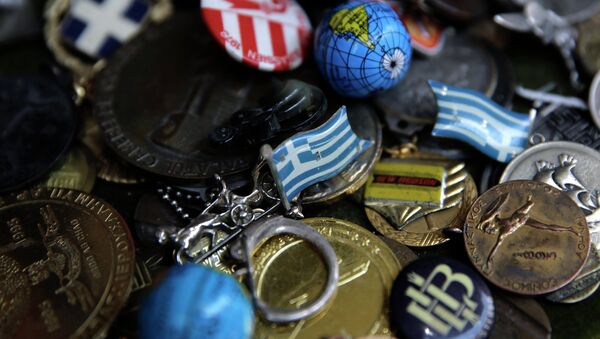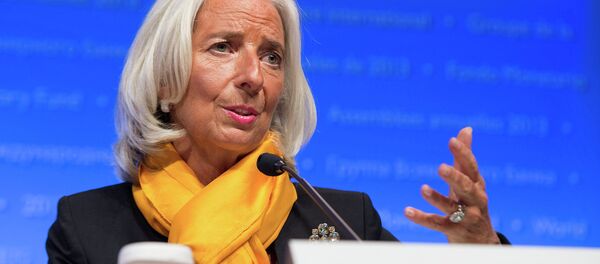DWN quoted a recent article in the New York Times stating that: "Even as Greece's European neighbors are focused on the country's ability to repay its debts, the United States is intent on addressing Greece's geopolitical value as a NATO outpost at the southern tip of the Balkans and as an important gateway for energy from Central Asia."
Hence the dispute is not between Greece and the EU, but between the EU and the US, added DWN.
It all started with a memo dated May 14 that the IMF leaked to Paul Mason of Channel Four.
Marked "strictly confidential", the memo makes for interesting reading. The IMF reveals that "starting in June, and then in July and August, 11 billion euros are coming due and there will be no possibility for the Greek authorities to repay the whole amount unless an agreement is reached with their international partners."
The memo was apparently leaked to put pressure on the EU in the run-up to the gathering of European leaders in Riga for the Eastern Partnership Summit on 21-22 May. Either a deal is reached then, or Greece will default a couple of weeks later.
The future lies before us, the challenges are great and ultimately, we will all be judged on the results. Thank you. @SEV_Fed #Greece
— Alexis Tsipras (@tsipras_eu) May 18, 2015
The IMF memo states that "some recent progress" has been made between Greece and its lenders "on three areas: VAT reforms, tax administration and on the insolvency framework."
But, the IMF memo continues, "in other areas no progress has been achieved" — areas such as the pension system, labor market and the public administration.
These, together with the re-hiring of 4,000 former civil servants, stand in the way of a deal.
Who Pays? The EU, Of Course!
Here is the IMF memo again: "While staff emphasized they are not pushing the European partners to consider debt relief, at the same time staff noted the numbers need to add up. In particular, it was noted there is an inverse relationship between reforms and sustainability."
According to Paul Mason of Channel Four:
"This translates as: the more austerity the Europeans demand, the bigger the chance that Greece defaults on its debts."
Indeed the IMF is not content with so-called "quick and dirty" solutions favored by the EU. Which is sensible enough, giving the EU's attitude to just bind time and delay real solutions.
The problem is who foots the bill. We are talking of IMF own credit risks with Greece, after all. And yet, the IMF memo mentioned "debt relief" in connection to "the European partners". So, just as with sanctions on Russia, the US decides, the EU pays.
EU Hits Back With Own Leaked Memo
Yesterday, the EU hit back by leaking its own — strictly confidential, of course — memo to the Greek newspaper Vima, Paul Mason of Channel Four reported.
The EU memo contains the European Commission's proposal to keep Greece afloat — and in the Eurozone. Clearly the US have succeeded in persuading the EU that Grexit is a no-go.
The show must go on and here is how — the harshest austerity measures will be delayed for two years, and $5.6 billion (€5bn) of bailout money provided to help finance the Greek budget.
As the NYT has written: "European and international lenders continue to hold back on releasing $8.1 billion (€7.2bn) in funds from a bailout program, demanding economic overhauls in Greece that the Tsipras government has so far been reluctant to carry out."
"To get the money," — explains again Mason, quoting Vima — "Greece has to run a primary surplus of 0.75 per cent of GDP — much lower than the previous demands from the ECB and IMF. And a surplus of 2 per cent of GDP in 2016.
"This rises to 3.5 per cent for both of the next years, but would have to be seen as notional — as committing to anything in 2018 barely matters when you are three weeks from default."
As for the labor market, a contentious point between the IMF and Greece, the EU will demand no reforms. But public sector workers' pensions, another contentious point, will have to be reduced.
What the above plan amounts to, however, is precisely what the IMF calls "quick and dirty solutions".
The EU memo hence, is hardly the latest chapter of the "save Greece saga", but by now we can be confident that, one way or the other, quick and dirty or with EU-footed "debt relief", Greece will be offered to remain in the Eurozone.
Will it accept? It is not just a financial decision. It is a highly political, almost civilization one. To remain in the Eurozone means to stay under Brussels and Washington. To exit, might open up other opportunities. Greece has indeed been invited by Russia to join the New Development Bank (NDB).
US Diktat, Greek Finger Flick
Whether Greek Prime Minister Alexi Tsipras will want, or even be able to, sell the EU deal to his voters and backbenches remains to be seen.
We'll make sure that Greece avails itself of the programs in @JunckerEU's package for financing investment. @SEV_Fed #Greece
— Alexis Tsipras (@tsipras_eu) May 18, 2015
In a veritable, last minute flinger flick, Greek Finance Minister Varoufakis said last night that the referendum will be on Grexit, not on any deal, be they IMF or EU sponsored.
As for Washington's stance, DWN quoted sources in the financial scene:
"The USA will not want to hear any discussions about a Grexit nor will any hard negotiations between EU-creditors and Greece be allowed."
So, it really is up to the people of Greece.





